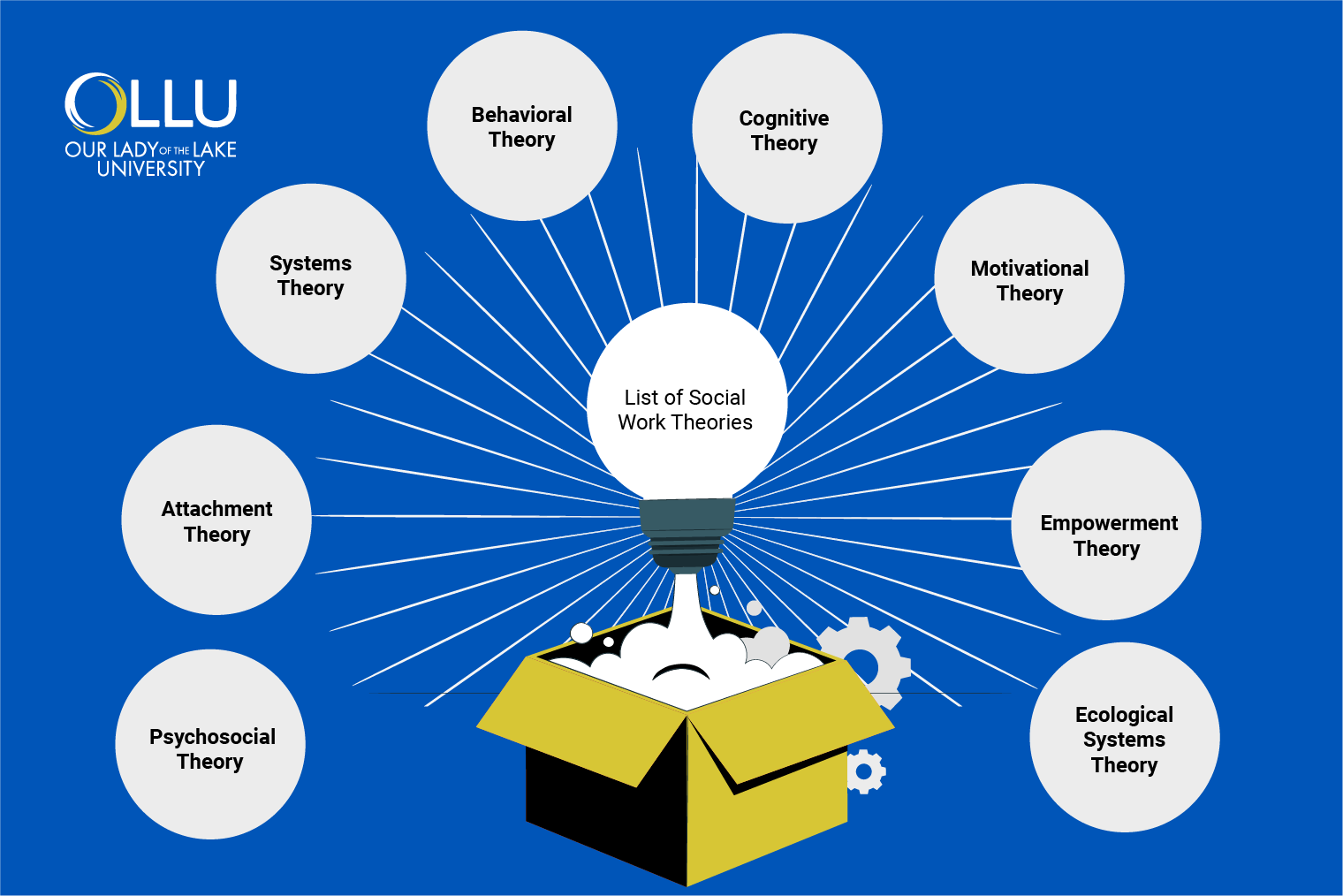15 Social Work Theories You Should Know About
Mar 14, 2024

Social work theories serve as foundational frameworks guiding practice, informing
interventions, and understanding human behavior in social contexts. They are essential
tools for addressing individual and systemic challenges, providing critical insights
from psychological and sociological perspectives.
Integrating theory into practice enables practitioners to undertake critical analysis, develop tailored interventions, and advocate for social justice. By understanding these theories, individuals can enhance their effectiveness and comprehension of complexities in human interactions and societal structures as they aspire to become social workers. This blog highlights their significance in promoting holistic well-being and fostering positive change within communities.
What Is Social Work Theory?
Social work theory provides frameworks for understanding human behavior and social systems, guiding effective practice in the field. It explains dynamics in individual, family, group, and community functioning within various social, cultural, economic, and political contexts. Social workers use theory to analyze client needs and develop tailored interventions. Whether drawing from psychological or sociological theories, social work theory guides efforts to address social injustice and empower individuals for positive change. Ultimately, it is a roadmap for navigating complex human experiences and societal systems.
Why Are Social Work Theories Important?
Social work theories are crucial for understanding and addressing diverse social issues, providing a framework for interventions and strategies. They offer insights into human behavior, social systems, and societal structures, enabling tailored interventions. By applying ecological systems theory or feminist theory, social workers address poverty, homelessness, and mental health challenges. These theories also inform advocacy efforts for social justice and equity. Social work theories empower practitioners to effect positive change and help individuals and communities achieve their full potential.
List of Social Work Theories

Below, we explore various social work theories and their core concepts, practical
implications, and significance in guiding social work interventions and strategies.
Psychosocial theory
The psychosocial theory, developed by Erik Erikson, examines the relationship between individual psychological development and social interactions across the lifespan. It focuses on psychosocial stages marked by specific developmental tasks and conflicts from infancy to late adulthood. This theory emphasizes the influence of social relationships, cultural factors, and societal expectations on identity and well-being. Understanding psychosocial theory aids social workers in assessing individuals' developmental needs and tailoring interventions to support healthy development, promote resilience, aid in identity formation, and address psychosocial challenges impacting clients' lives.
Attachment theory
Attachment theory, by John Bowlby, emphasizes the impact of early relationships on emotional and social development. It suggests that infant-caregiver attachment influences later relationships and well-being. Secure attachment, marked by trust, fosters resilience, while insecure attachment can hinder healthy connections. In social work, understanding attachment theory is vital for assessing individuals' attachment patterns and tailoring interventions to promote secure attachments and healing from past traumas. By prioritizing nurturing relationships, social workers support clients in building stronger connections and enhancing overall well-being.
Systems theory
In social work, systems theory views individuals as interconnected within various systems, emphasizing reciprocal influences between individuals and their environments. Developed by scholars Bronfenbrenner and Parsons, it highlights dynamic interactions among individuals, families, communities, and societies. Social workers use this theory to address individual needs and structural factors, assess individuals' ecological contexts, identify strengths and challenges within their social systems, and develop interventions for holistic well-being. Recognizing interconnectedness, social workers advocate for systemic changes and empower clients to navigate complex social dynamics.
Behavioral theory
Behavioral theory is rooted in the work of the behaviorist B.F. Skinner. It focuses on understanding and modifying behavior through observable stimuli and responses. It emphasizes the role of environmental factors in shaping behavior, suggesting behavior can be learned and unlearned through reinforcement, punishment, and modeling. In social work, it informs behavior modification techniques to address maladaptive behaviors and promote positive change. Social workers use positive reinforcement, behavior contracts, and systematic desensitization to help clients overcome challenges and achieve goals, improving their overall quality of life.
Cognitive theory
Cognitive theory, rooted in cognitive psychology, focuses on how individuals perceive, process, and interpret information, emphasizing the role of thoughts and beliefs in shaping behavior and emotions. In social work, it informs interventions to identify and challenge negative thought patterns, promoting cognitive restructuring and problem-solving skills through techniques like cognitive-behavioral therapy (CBT). By applying cognitive principles, social workers support clients in developing resilience, enhancing self-awareness, and fostering positive change.
Motivational theory
Motivational theory, popularized by psychologists Abraham Maslow and Frederick Herzberg, explores factors driving human behavior, focusing on intrinsic motivation, needs fulfillment, and goal setting. In social work, understanding this theory is vital for engaging individuals and fostering positive change. By assessing their motivations and aspirations, social workers tailor interventions to align with their values. Motivational interviewing techniques derived from this theory enhance collaboration and empowerment. Addressing individuals' needs helps them overcome barriers and work towards goals, improving overall well-being. Integrating motivational theory into practice boosts social workers' ability to support clients in realizing their potential.
Empowerment theory
Empowerment theory in social work emphasizes fostering self-efficacy and promoting individual empowerment. It acknowledges individuals' strengths and capacities to actively participate in their lives and communities. Social workers facilitate individuals' ability to overcome challenges and achieve goals by providing self-determination, decision-making, and skill-building opportunities. Empowerment-oriented interventions enhance individuals' sense of control, autonomy, and confidence through collaborative goal-setting, advocacy, and skill-building exercises. By promoting empowerment, social workers support individuals in realizing their potential and fostering resilience amidst adversity.
Ecological systems theory
Ecological systems theory, by Urie Bronfenbrenner, explains interactions between individuals and environments. It delineates layers like the microsystem (immediate surroundings), mesosystem (interactions between microsystems), exosystem (external environments indirectly impacting individuals), and macrosystem (cultural and societal influences). In social work, it guides practitioners in assessing individuals' contexts comprehensively. Understanding these layers aids in developing interventions addressing both individual and systemic factors. Social workers advocate for systemic changes and empower clients to navigate social environments effectively.
Family systems theory
Family systems theory, central to social work, views the family as an interconnected unit where each member shapes and is shaped by others. It emphasizes reciprocal relationships, communication patterns, roles, and boundaries within families. Understanding family systems is crucial in recognizing the interplay between family dynamics and individual well-being. Social workers support positive change by assessing family functioning, addressing relational dynamics, and enhancing overall well-being. This theory offers insights into the root causes of individual struggles, informing interventions for resilience and healing within the family unit.
Contingency theory
Contingency theory in social work emphasizes adaptability and responsiveness to diverse individual and community needs. It stresses tailoring interventions to specific circumstances rather than rigid approaches. Social workers recognize the importance of flexibility and responsiveness to unique contexts and challenges. By employing a contingency approach, practitioners adjust strategies based on individuals' dynamic situations, preferences, and resources, enhancing outcomes and promoting empowerment. This theory encourages social workers to embrace flexibility, innovation, and creativity to meet evolving needs effectively.
Social learning theory
Social learning theory, by Albert Bandura, emphasizes observational learning's role in behavior shaping. It suggests individuals learn by observing and modeling others' behaviors. Understanding this theory is vital in social work to comprehend individuals' skill acquisition and coping mechanisms. Social workers use observational learning principles, such as modeling and role-playing, to promote skill acquisition and self-efficacy. By fostering supportive environments, social workers help individuals develop healthier behaviors and relationships, promoting positive change and empowerment.
Symbolic interactionism
Symbolic interactionism, foundational in sociology, examines how symbols and interactions shape individuals' behaviors and perceptions in social contexts. It emphasizes meaning construction through social interactions and shared symbols like language and gestures. In social work, it underscores understanding clients' subjective experiences and interpretations. Social workers recognize symbols' significance in client-practitioner interactions and societal systems, tailoring interventions accordingly. Symbolic interactionism informs efforts to facilitate connections and promote empowerment in diverse social contexts.
Conflict theory
Conflict theory, a key sociological perspective, analyzes societal inequalities and power imbalances as sources of conflict and social change. It views society as marked by competition over scarce resources, leading to dominance by certain groups. In social work, practitioners use conflict theory to address systemic injustices and disparities by understanding root causes like oppression and discrimination. They advocate for marginalized individuals, challenge oppressive structures, and promote social justice. Conflict theory informs interventions empowering marginalized groups and ensuring equitable opportunities for all.
Transpersonal theory
Transpersonal theory, rooted in psychology, integrates spirituality and consciousness to understand human well-being. It emphasizes the interconnectedness of mind, body, and spirit, highlighting spiritual experiences and self-transcendence. In social work, transpersonal theory prioritizes addressing clients' spiritual needs and exploring existential questions for healing and growth. Social workers support clients' journeys toward self-discovery and meaning-making by respecting diverse beliefs. This theory underscores spirituality's impact on health, offering a holistic framework for personal transformation.
Rational choice perspective
The rational choice perspective in sociology and economics focuses on individuals' decision-making processes to maximize outcomes. In social work, it's crucial to understand clients' behaviors. Social workers use it to assess clients' motivations, preferences, and constraints, tailoring interventions for informed decision-making, empowerment, and goal attainment. This perspective emphasizes considering clients' agency and autonomy effectively.
Key Takeaways
Diverse social work theories provide essential frameworks for understanding human behavior, societal dynamics, and client needs, such as psychosocial and symbolic interactionism. Integration of these theories allows tailored interventions to address injustices and foster positive change, emphasizing the multifaceted nature of human experiences and interconnectedness. Ultimately, this integration enhances social workers' ability to advocate for marginalized populations and promote resilience.
Ready to make a difference in people's lives? Explore OLLU's renowned Social Work programs today, Bachelor of Social Work (BSW), Master of Social Work (MSW), or PhD in Social Work, and embark on your journey to become a compassionate and impactful social worker!
Frequently Asked Questions (FAQs):
What are common practice models in social work?
Standard practice models in social work include the strengths-based perspective, cognitive-behavioral therapy (CBT), solution-focused therapy, and person-centered therapy.
What is the most used theory in social work?
The most widely used theory in social work is the Ecological Systems Theory, which examines how individuals are influenced by their environments at multiple levels, such as micro, meso, exo, and macrosystems.